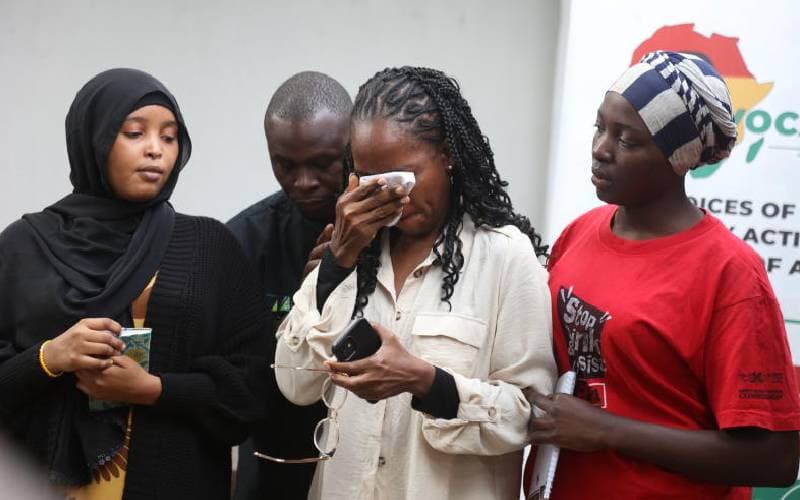We're loading the full news article for you. This includes the article content, images, author information, and related articles.
A wave of violent state responses to protests, most recently in Tanzania, signals a dangerous erosion of democratic norms that could destabilize trade and security for Kenya and its neighbours.

A worrying trend of rising political intolerance is sweeping across East Africa, marked by violent crackdowns on protests, state-sanctioned abductions, and the systematic suppression of opposition voices. This escalating repression, brought into sharp focus by the turmoil surrounding Tanzania's general election on Wednesday, October 29, 2025, threatens to unravel decades of democratic gains and jeopardise the region's fragile stability and economic integration.
In Dar es Salaam, what was meant to be a democratic exercise descended into chaos as youth-led protests against a contentious election erupted in multiple neighbourhoods. Security forces responded with tear gas and live ammunition, leading to at least two fatalities, and the government imposed a curfew and disrupted internet services. The protests were fuelled by the disqualification of major opposition parties, including Chadema, whose leader Tundu Lissu is on trial for treason, effectively leaving President Samia Suluhu Hassan's ruling Chama Cha Mapinduzi (CCM) party virtually unchallenged. Opposition figures and human rights organisations have labelled the election a “sham” and a “coronation,” citing a climate of fear cultivated through arbitrary arrests and enforced disappearances in the months prior.
Amnesty International, in a report released just before the election, documented a systematic effort to suppress dissent, accusing the government of weaponising laws to silence critics. The Tanzanian government has denied the allegations, reaffirming its commitment to human rights and the rule of law.
The events in Tanzania are not isolated but reflect a broader, deeply concerning pattern across the East African Community (EAC). In Kenya, the state's response to civil demonstrations has grown increasingly severe. Commemorative protests on June 25, 2025, for demonstrators killed in 2024, resulted in at least 16 more deaths amid a heavy police and military presence. Human rights groups report a surge in abductions of government critics, with the Kenya National Commission on Human Rights (KNCHR) noting 82 such cases since June 2024. The United Nations has repeatedly expressed alarm over the use of excessive force, arbitrary detentions, and media restrictions, noting that the Kenyan government had not responded to formal inquiries as of late October 2025.
In Uganda, President Yoweri Museveni, in power since 1986, continues to preside over a system described by critics as repressive. The regime is frequently accused of using state machinery to intimidate and prosecute opposition figures, most notably Bobi Wine. This pattern has taken on a troubling cross-border dimension. On October 1, 2025, two Kenyan activists, Bob Njagi and Nicholas Oyoo, were abducted in Uganda after attending a rally for Wine. Despite a Ugandan High Court order to produce the men, their whereabouts remain unknown, prompting former Kenyan Chief Justice David Maraga to condemn the “criminal silence” of both governments and warn of a “dark cloud of cross-border tyranny.”
This widespread erosion of democratic space carries significant consequences for Kenya and the wider region. Political instability is a primary risk to economic growth, discouraging foreign investment, disrupting trade, and hampering tourism. As member states of the EAC, which is founded on principles of good governance and rule of law, the turn towards authoritarianism undermines the very foundation of regional integration. The East African Legislative Assembly member Maina Karobia, serving as deputy head of the EAC's election observation mission in Tanzania, noted that observers were tasked with upholding transparency to support a peaceful and credible election. However, with state-sanctioned repression becoming commonplace, the EAC's ability to enforce its own democratic standards is facing a severe test.
For Kenya, the instability of its neighbours poses direct threats. Increased political violence could trigger refugee flows, strain diplomatic relations, and disrupt crucial cross-border trade routes. Furthermore, the apparent collaboration between regional security forces in targeting activists sets a dangerous precedent that threatens the safety of Kenyan citizens and civil society actors throughout East Africa. As the democratic deficit widens, the collective economic and security architecture that Kenya relies upon is put at risk, demanding urgent and principled engagement to reverse the tide of intolerance.
Keep the conversation in one place—threads here stay linked to the story and in the forums.
Sign in to start a discussion
Start a conversation about this story and keep it linked here.
Other hot threads
E-sports and Gaming Community in Kenya
Active 9 months ago
The Role of Technology in Modern Agriculture (AgriTech)
Active 9 months ago
Popular Recreational Activities Across Counties
Active 9 months ago
Investing in Youth Sports Development Programs
Active 9 months ago
Key figures and persons of interest featured in this article